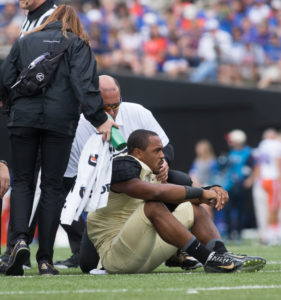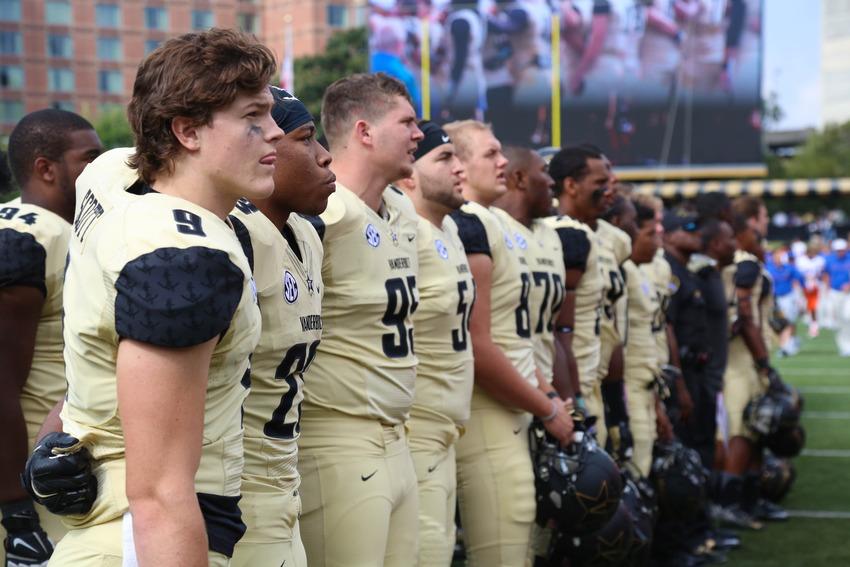On Saturday, fans witnessed two strong defenses battle it out as Vanderbilt looked to seal its first home victory against Florida in over two decades.
The home side forced two three-and-outs on Florida’s first two drives, clearly determined not to be discounted. The Commodores outgained Florida in total offense as Ralph Webb continuously muscled his way through the defensive line. Vanderbilt fought up until the final minutes when it seemed almost as if they might be able to send the game into overtime, defending, as head coach Derek Mason often says, “every blade of grass.”
And in the end, they still lost.
What the 13-6 scoreline does convey is that it was a close game; Florida may have won, but it did not blow Vanderbilt out of the water. Vandy’s nationally recognized defense frustrated Florida’s offensive line, limiting the Gators to one touchdown.
What it does not convey is how ugly the game looked. Call it having a slow day, call it playing down to the level of the opponent, call it whatever you like — Florida’s offense looked shaky, and the Commodore defense showed up in a big way. The only problem is that it takes more than defense to win a game.
Arguably, Vanderbilt’s offense had the necessary skill to defeat Florida, but it would be difficult to tell by the way it played that day. Nevertheless, there are glimpses that tell the true story: Webb continues to tear up defenses and now needs about 500 yards rushing to break the school record just halfway through his junior year. Alongside him are younger players such as Kyle Shurmur, Kalija Lipscomb and Khari Blasingame who have potential and a hunger to have success with this team over the following years.
Yet somehow, progress seems to be halted. The results don’t seem to accurately reflect the ability of the players. So why then do they continue to find themselves coming up short when it really matters? A look at the psychological factors that keep teams down can help fans understand why things keep going wrong.
Negative Expectations
It’s no secret that Vanderbilt fans are unhappy with the football team. The results aren’t what they want, and therefore, they expect the team to do poorly. However, what the fans might not realize is the impact those low expectations have on the psychology of the team.
Football is a mental as well as a physical game. For Vanderbilt football players, gifted in brainpower as well as brawn, it is even more mental. You can see this with players of any sport: a team has a few bad results and people start to doubt the players’ ability, the players start to doubt their own ability and get inside their own heads.
It doesn’t take a Vanderbilt Ph.D. candidate to see that this is the type of cycle that the football team is stuck in, but it might take one to figure out how to break it. An SEC win is a start, but it probably won’t be enough; expectations have to be shattered.
Lack of Support
In addition to being surrounded for a week by talk of how the odds are against you, imagine running onto the field on gameday only to see a sea of blue and orange in the stands swallowing up the black and gold. The Commodore football team was greeted to such a sight on Saturday, and while the Gator majority was not overwhelming at first, many Commodore fans left before the first half ended and many more during the second half, leaving faithful Florida fans more elbow room.
Not only that, but these Florida fans weren’t quiet. They were constantly on their feet, cheering, in earnest support of their team. Even when it didn’t seem clear that Florida would win. Even when it seemed that Vanderbilt was going to come back. The whole time.
By contrast, the atmosphere in the Vanderbilt student section at football games is abysmal. Basically, the fans can be divided into three categories: the small group of die-hard fans that actually show up with painted faces and Vanderbilt merchandise and cheer on the team; the medium-sized group of students that show up just because they can, check out the game for a quarter or two and then split; and by far the largest group of students that crash after tailgating and skip the game, asking the next day how the team did, if they remember that there was a game at all.
To say the least, this setup does not create the most supportive atmosphere for the team.
Fans might not think that whether or not they show up for the team matters, but it was hard not to notice the Florida fans as they shouted, swayed, jumped and cheered during the ups and downs of the game. And the players do often notice things like that — after all, they want to know that their fellow students support them and their efforts are being noticed. One can only imagine how disheartening it must be to look up at the stands from the field and see evidence of such a lack of faith from the fans in the team.
Part of the lack of turnout can be attributed to other factors as well — places all over the world send students to Vanderbilt, many of whom were never interested in American football due to an obvious lack of emphasis on it in their cultures. Other students come to Vanderbilt already supporting their local teams.
Yet others are simply uninterested in football and watching what they’ve heard is a losing team. But no matter what the reasons are for students not coming to games, the impact that their lack of enthusiasm has on the team is undeniably negative.

Pressure
Additionally, this was a big game for Vanderbilt. A win would have balanced the Commodores’ SEC record as well as given them a winning overall record. Not only that, but a victory on Saturday would have been Vanderbilt’s first home victory against Florida in 26 years, its first consecutive victories in three years and Mason’s 10th career victory.
Florida’s record against Vanderbilt was impressive, but the Gators had let Tennessee get the better of them the week before for their first loss of the season. For the next game, that loss either meant that Vanderbilt could have capitalized on a team still reeling in shock, or that Florida would be looking to redeem themselves and get back on track. The result ended up being closer to the latter; it’s contestable as to whether Florida’s performance redeemed them, but as far as results go, they’re back to winning ways.
The pressure of such a game, however, was clearly significant. A certain amount of pressure is good for athletes, of course; it keeps them focused and gives them a sense of urgency.
However, athletes have to be trained not to let excess stress get to their heads. The Commodore football team is not prepared to deal with the demands of such situations.
Every fan is familiar with seeing the team crack under pressure — they of course know Shurmur, despite his passing statistics, is capable of throwing the ball to a player a few yards away when the pressure is low. And occasionally, with every team, the players are sometimes going to slip up — it happens to even the best players in high pressure situations. The problem with the Vanderbilt football team is that it happens a bit too often.
Emotions
In addition to outside factors, emotions, particularly anger, can have a big impact on the game.
Anger as well can have a negative effect on the team’s performance. Like stress, anger can be good for a team up to a certain point, getting their blood pumping and motivating them against a common enemy.
However, like stress, too much can cloud their judgment.
Training players to manage their emotions is a part of coaching in most every sport. If players are angry before the game starts, they might not be levelheaded enough to play to peak performance. In addition, anger at themselves can have a particularly negative effect on the way they play. If the players are frustrated at themselves for their mistakes, then they are more likely to continue making those mistakes. Another vicious cycle.
All in all, the psychological aspect of the game has a bigger impact on why potentially good teams lose than many people think. Of course, the woes of the team cannot be explained away by solely psychological factors; after all, it all had to start with a string of losses somewhere.
However, unless the players get out of their own heads and clean up the mental aspect of their game, their physical game will continue to suffer and they will continue to lose more than they win.
But really, what else does anyone expect?











